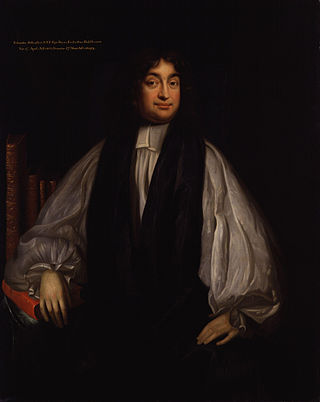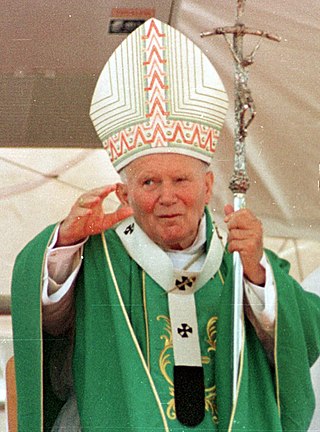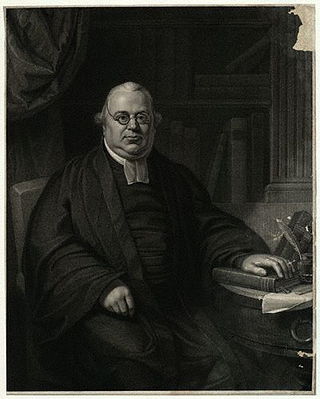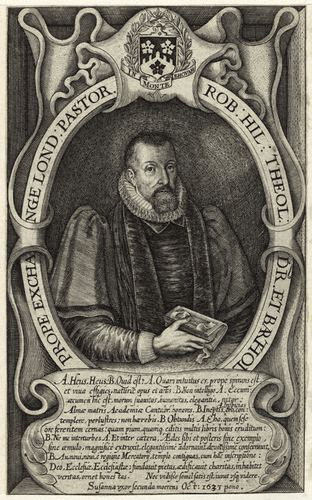Related Research Articles
Anglicanism is a Western Christian tradition which developed from the practices, liturgy, and identity of the Church of England following the English Reformation, in the context of the Protestant Reformation in Europe. It is one of the largest branches of Christianity, with around 110 million adherents worldwide as of 2001.

Jeremy Taylor (1613–1667) was a cleric in the Church of England who achieved fame as an author during the Protectorate of Oliver Cromwell. He is sometimes known as the "Shakespeare of Divines" for his poetic style of expression, and he is frequently cited as one of the greatest prose writers in the English language.

Edward Stillingfleet was a British Christian theologian and scholar. Considered an outstanding preacher as well as a strong polemical writer defending Anglicanism, Stillingfleet was known as "the beauty of holiness" for his good looks in the pulpit, and was called by John Hough "the ablest man of his time".
John Floyd was an English Jesuit, known as a controversialist. He is known under the pseudonyms Daniel à Jesu, Hermannus Loemelius, and George White under which he published.

Richard Challoner was a leading figure of English Catholicism during the greater part of the 18th century, and the titular Bishop of Doberus. In 1738, he published a revision of the Douay–Rheims translation of the Bible.

The teachings of Pope John Paul II are contained in a number of documents. It has been said that these teachings will have a long-lasting influence on the Church.

Thomas Belsham was an English Unitarian minister.

John Overall (1559–1619) was the 38th bishop of the see of Norwich from 1618 until his death one year later. He had previously served as Bishop of Coventry and Lichfield, as Dean of St Paul's Cathedral from 1601, as Master of Catharine Hall from 1598, and as Regius Professor of Divinity at Cambridge University from 1596. He also served on the Court of High Commission and as a Translator of the King James Version of the Bible.
Anglican Marian theology is the summation of the doctrines and beliefs of Anglicanism concerning Mary, mother of Jesus. As Anglicans believe that Jesus was both human and God the Son, the second Person of the Trinity, within the Anglican Communion and Continuing Anglican movement, Mary is accorded honour as the theotokos, a Koiné Greek term that means "God-bearer" or "one who gives birth to God".

The Caroline Divines were influential theologians and writers in the Church of England who lived during the reigns of King Charles I and, after the Stuart Restoration, King Charles II. There is no official list of Caroline-era divines; they are defined by the era in which they lived, and Caroline Divines hailed from England, Ireland, Scotland, and Wales. However, of these four nations, it is Caroline England which is most commonly considered to have fostered a golden age of Anglican scholarship and devotional writing, despite the socio-cultural upset of civil war, regicide, and military rule under Oliver Cromwell. Importantly, the term divine is restricted neither to canonised saints nor to Anglican figures, but is used of many writers and thinkers in the wider Christian church.

Birchley Hall is a grade II* listed Elizabethan house built in about 1594, in Billinge, Merseyside, England.

Marialis Cultus is the title of a Mariological apostolic exhortation by Pope Paul VI issued on February 2, 1974. It is subtitled: "For the Right Ordering and Development of Devotion to the Blessed Virgin Mary", and discusses Marian devotions, clarifying the way in which the Roman Catholic Church celebrates and commemorates Mary, the mother of Jesus. The exhortation sought to integrate devotion to Mary into the pastoral catechetical process, especially in liturgical catechesis, in a manner harmonious with the reforms of Vatican II. Mary must always be understood in relation to Jesus.
Devotions Upon Emergent Occasions, and severall steps in my Sicknes is a prose work by the English metaphysical poet and cleric in the Church of England John Donne, published in 1624. It covers death, rebirth and the early modern concept of sickness as a visit from God, reflecting internal sinfulness. The Devotions were written in December 1623 as Donne recovered from a serious but unknown illness – believed to be relapsing fever or typhus. Having come close to death, he described the illness he had suffered from and his thoughts throughout his recovery with "near super-human speed and concentration". Registered by 9 January, and published soon after, the Devotions is one of only seven works attributed to Donne which were printed during his lifetime.
Matthew Kellison was an English Roman Catholic theologian and controversialist, and a reforming president of the English College, Douai.

Robert Hill was an English clergyman, a conforming Puritan according to Anthony Milton.
Robert Nelson was an English lay religious writer and nonjuror.
Nathaniel Spinckes (1653–1727) was an English nonjuring clergyman, a leader in the dispute among the nonjurors about the "usages" which split the "non-usagers",, against returning to the first prayer-book of Edward VI, as the "usagers", led by Jeremy Collier, advocated.

Theophilus Dorrington (1654–1715) was a Church of England clergyman. Initially a nonconforming minister, he settled at Wittersham in The Weald, an area with many Dissenters, particularly Baptists. He became a controversialist attacking nonconformity. He also warned that the Grand Tour could create Catholic converts, by aesthetic impressions.
Susanna Hopton née Harvey (1627–1709) was an English devotional writer.

Robert Traill was a church minister at Cranbrook in Kent. He was born at Elie in Fife in 1642. He was incarcerated on the Bass Rock, an island in the Firth of Forth from July 19, 1677 to October 5, 1677. His work was often quoted by J. C. Ryle and is still published in the 21st century.
References
- ↑ "Austin, John (ASTN631J)". A Cambridge Alumni Database. University of Cambridge.
- ↑ Stephen, Leslie, ed. (1885). . Dictionary of National Biography . Vol. 2. London: Smith, Elder & Co. p. 264.